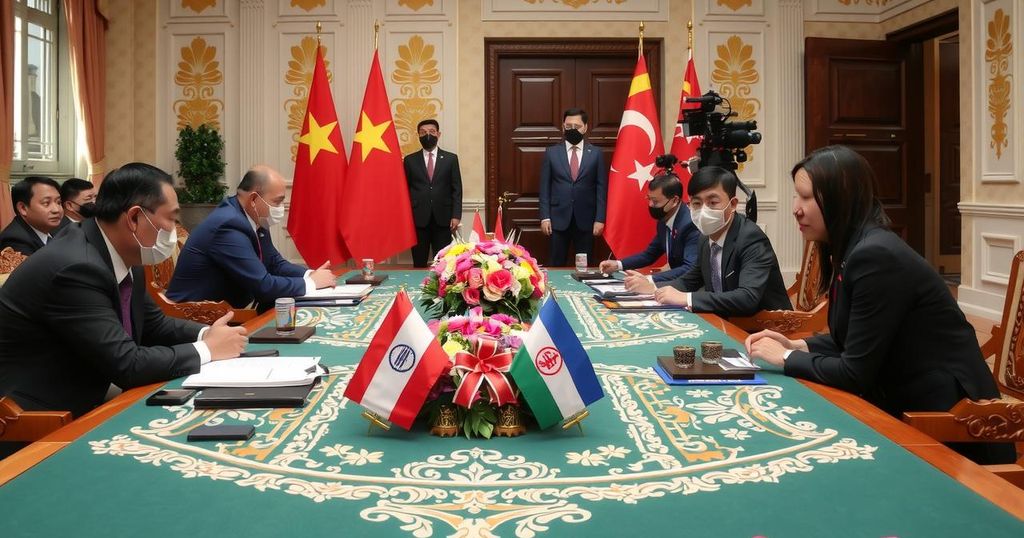World news
” MELO, ASIA, BRAZIL, CARIBBEAN, CHIAPAS, CLAUDIA, CLAUDIA SHEINBAUM PARDO, COLOMBIA, CUBA, DEMOCRACY, FOREIGN POLICY, GO, GUSTAVO PETRO, LATIN AMERICA, MEXICO, MEXICO CITY, NATIONAL PALACE, NORTH AMERICA, PETRO, PHILIPPINES, POLITICS, SOUTH AMERICA, TRADE RELATIONS
Oliver Grayson
0 Comments
Sheinbaum and Petro Discuss Progressive Unity and Migration in Mexico City
Mexican President Claudia Sheinbaum hosted Colombian President Gustavo Petro at the National Palace to discuss unity among progressive governments, regional migration issues, and historical recognition. The leaders agreed to improve the treatment of Colombians in Mexico and committed to a collaborative agenda focused on sustainability and Latin American integration.
On Monday, Mexican President Claudia Sheinbaum hosted Colombian President Gustavo Petro at the National Palace for their third meeting in a short span. The leaders focused on enhancing unity among progressive governments in Latin America, addressing migration issues, and fostering regional integration between their nations. Sheinbaum highlighted the extraordinary warmth in their interactions, underscoring their shared commitment to sustainability and social justice as key tenets of their bilateral relationship.
During their discussion, both leaders acknowledged the crucial need for cooperation on migration, particularly amidst reports of mistreatment of Colombian nationals in Mexico. They agreed to enhance the exchange of information to ensure dignified treatment for Colombians traveling through Mexico. The leaders underscored the necessity of addressing migration with a focus on human rights, particularly considering the ongoing migration crisis from Venezuela.
The meeting culminated in an agreement to rejuvenate efforts to locate the remains of José María Melo, Colombia’s first Indigenous president, who was killed in 19th-century Mexico amid the Reform War. Both leaders recognized the historical significance of Melo in the shared narratives of their countries and the importance of honoring such legacies.
President Sheinbaum indicated that the meeting served to reinforce regional unity and strategic alliances in the face of global challenges, reflecting on the commonalities among progressive governments throughout Latin America. She emphasized the potential economic strength of Latin America as a unified bloc, advocating for an expanded trade agreement involving the United States, Canada, and Mexico that would benefit the southern regions.
As Sheinbaum clarified, this was not a formal state visit; however, it exemplified the genuine camaraderie and mutual respect between the two leaders. She remarked, “It was a visit of a president, but it didn’t have all the protocols of a state visit.” This characterization illustrates the intent behind their engagement—fostering partnership rather than adhering to traditional diplomatic formalities.
The meeting between Presidents Sheinbaum and Petro is situated within the framework of increasing collaboration among leftist leaders in Latin America, aimed at establishing a progressive block within the region. Both leaders have previously met at significant events, reflecting their shared vision for a unified approach to both domestic and international challenges. The context of rising migration pressures, particularly from Venezuela, further intensifies the urgency for cooperative solutions on migration management and regional integration. Moreover, the historical resonance of political leaders like José María Melo illustrates the enduring legacies and contexts that shape contemporary governance in Latin America.
The meeting between President Sheinbaum of Mexico and President Petro of Colombia underscores a notable alignment among progressive governments in Latin America, focused on unity and cooperation. The discussions emphasized the importance of human rights in managing migration and sought to address past grievances regarding treatment of Colombian nationals. Both leaders also reaffirmed their commitment to addressing regional historical contexts and advancing economic partnerships, indicating a significant step towards deeper integration among Latin American nations.
Original Source: mexiconewsdaily.com




Post Comment